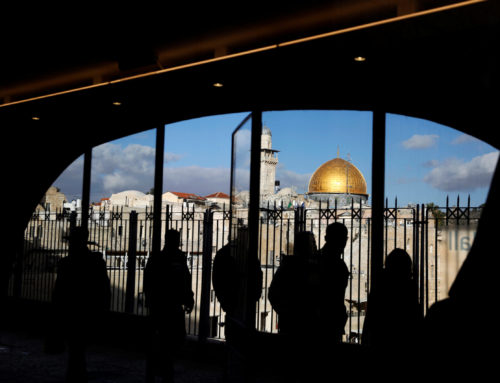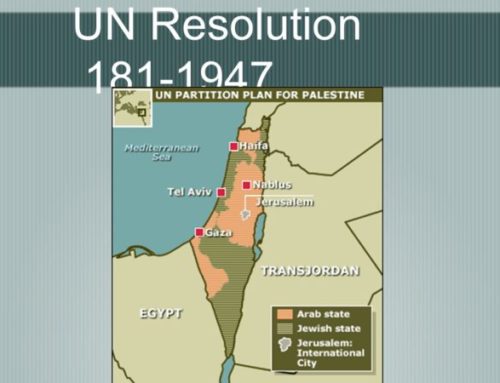Why is the question of sovereignty important?
In today’s world, the state is the legal and political entity that controls and organizes the lives of millions of within its borders. States deal with a great deal of difficult problems, and to ensure that law and order remains intact, a strong and secure state government must be established, to ensure that state sovereignty is protected.,[1]Sovereignty is usually connected to territory. Every geographical location around the world must have an owner who holds authority over it. .[2] A .Because of Jerusalem’s history of occupation and colonization, the question of sovereignty becomes very critical when assessing ownership and security threats.[3] Who has sovereignty over Jerusalem ? Who has the real authority over the land and is therefore eligible to enact laws and oversee order?
Historical Background
Prior to the British Mandate, Palestine was part of the Ottoman Empire. [4] Palestine was not a separate part of the Turkish Empire, much like the lands that are now known as Syria, Jordan, Iraq and Lebanon were not. Still, the inhabitants of Palestine had equal civil and political rights with Turkish citizens in the one big empire. [5]
The city of Jerusalem was always part of the Ottoman Empire and never gained any distinctive status despite its religious and historic importance.[6] This was the case until the end of the 19th century, when Jerusalem and its surroundings were afforded an “autonomous” and independent status under the Turkish reorganization of 1887-1888. This new status did not mean that Jerusalem became totally independent. Instead, the city became directly linked to Constantinople, capital of the Ottoman Empire, and ceased to be governed by the governor of Damascus province.[7]After the First World War in 1917, the status of Palestine, along with that of the surrounding Arab countries, changed dramatically, as five new states emerged into existence as distinct legal and political entities. Article 22 (4) of the Convention of the League of Nations established the mandate system and put Lebanon, Jordan, Syria, Palestine and Iraq under British and French control[8] Syria and Lebanon became French mandates while Palestine, Jordan and Iraq became British mandates. Soon after, the people of Iraq revolted and gained their independence, while both Jordan and Palestine remained under British control. .9
Although these states were mandated, sovereignty over the five states rested with their inhabitants as these nations were recognized as independent and were said to be self-governing in the near future.[10]

Status Under the Mandate
It was clear from the beginning that the mandatory rule over the five new states was not aiming at stripping their status as legal and political entities; Essentially, the mandate system did not affect the rights of the inhabitants to govern themselves.[11]
Article 22 of the Convention considered the inhabitants of the newly formed states, including those living in Palestine, to be mature and developed enough to rule themselves, however it was held that the British and French would govern them until they were completely ready.[12] Essentially, the mandate was seen as a temporary procedure where Britain did not gain sovereignty over Palestine and Palestinians remained sovereign, although their power was temporarily suspended by British rule.[13]
The Article 1 of the Mandate Instrument over Palestine gave Britain powers of legislation and administration, while Article 12 of the instrument enabled it to control foreign relations.[14] However, this did not undermine Palestinian sovereignty. Palestinians, operating through the government of Palestine, negotiated and concluded agreements with Britain and entered into international treaties and conventions.[15]
The British Mandate did not and could not divest Palestinians of their right to sovereignty, as they were deprived from controlling legislative action in their land only temporarily. [16]
Under the Israeli Occupation
In 1948 the western part of Jerusalem was occupied by Israel, whereas the Eastern part of the city was annexed by Jordan. However, the United Nations, in its leading resolution 181 of 1948, decided to give Jerusalem recognition as a city with international status where it made it clear that neither Jordan nor Israel gained sovereignty over the city.[17] Though enforcement and application of this resolution did not play out as expected, as Israeli and Jordanian authorities continued acting as they had been, the official status and right of sovereignty did not change. This was supported over the years by the different resolutions and decisions of the UN different chambers.[18]
Resolution 181 of 1948 entrusted the Trusteeship Council with power to administer Jerusalem on behalf of the UN; However, the resolution did not vest sovereignty in the council and it did not divest Palestinians of their right over the city.[19]
The Israeli authorities enacted many laws[20] over the eastern part of the city after its annexation in 1967 in an attempt to legalize its existence and to establish real sovereignty over the city.[21] Furthermore, Israel enacted the Basic Law of 1980 which rendered Jerusalem as its capital.[22] Still, these actions of the occupying power Israel did not affect the legal status of the city, neither did it affect the right of its original inhabitants as the real owners of the land. This was supported with many UN resolutions emphasize this fact, especially resolution 478 of the UN Security Council that annulled all legislative and administrative actions of Israel in the city of Jerusalem and considered them void.[23]
[1] Gershon Baskin, Jerusalem of Peace: Sovereignty and Territory in Jerusalem’s Future (Israel/Palestine Center for Research and Information, 1994),p 90
[2] Baskin, Jerusalem of Peace, p 90
[3] Id
[4] Habib Ghanem, Jerusalem: a History and a Cause (Lebanon: Dar Al-Manhel, 2002), p 196
[5] Ghanem, Jerusalem, p 196 and Henry Cattan, Jerusalem (London: Saqi Books, 2000), p 107
[6] Cattan, Jerusalem, p 103
[7] Id
[8] Ghanem, Jerusalem, p 197
[9] Id
[10] Cattan, Jerusalem, p 107
[11]Ghanem, Jerusalem, p 197
[12]
Id p 198
[13] Ghanem, Jerusalem, p 198 and Cattan, Jerusalem, p 103
[14] Cattan, Jerusalem, 104
[15] Id
[16]Id p 107
[17]Ghanem, Jerusalem, p 199 and Cattan, Jerusalem, 105-106
[18] Ghanem, Jerusalem, p 199
/p>
[19]Cattan, Jerusalem,p 108
[20] the three main laws enacted by Israel then were: such as law of Power and Justice Systems, law amending the Municipalities Act, and law on the Preservation of Holy Places all enacted in 1967
[21]Osama Halabi, The Legal Status of Jerusalem and its Arab Citizens (Lebanon: Institute of Palestine Studies, 1997), p 7-8
[22] Halabi, The Legal Status, p 23
[23] Id p 26



